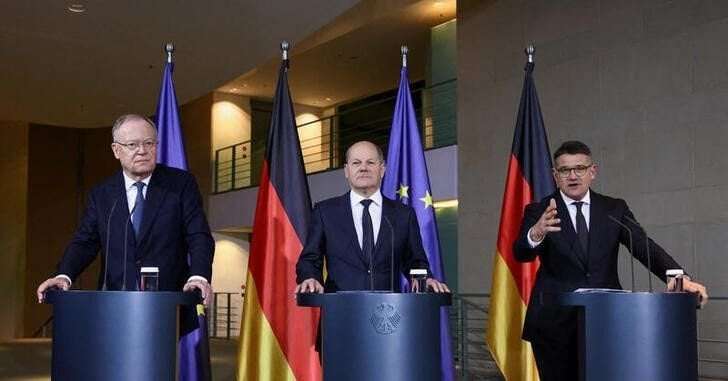German Chancellor Olaf Scholz, Minister President of Hesse Boris Rhein and Minister President of Lower Saxony Stephan Weil give a statement regarding the Germany pact on the day of a meeting of the country's 16 state premiers on current issues in Berlin, Germany November 6, 2023. REUTERS/Liesa Johannssen Acquire Licensing Rights
BERLIN, Nov 7 (Reuters) - Chancellor Olaf Scholz, seeking to reduce the number of asylum seekers and stem support for the far-right, agreed on a tougher migration policy and new funding for refugees with the heads of Germany's 16 states early on Tuesday.
Scholz's government has agreed measures to make it easier to deport migrants and to make the country a less attractive destination in the first place, in stark contrast to Berlin's perceived open-door policy under former Chancellor Angela Merkel.
The European Union is seeking to overhaul the bloc's asylum and migration rules to reduce irregular migration and member countries are attempting to cut their own deals with Rome announcing on Monday it would build centres in Albania to host sea migrants trying to come to Italy.
The meeting in Berlin was aimed at garnering state leaders' support for such moves and addressing local authorities' complaints that public coffers and infrastructure are overburdened.
As a result, Scholz's government agreed to pay the states and municipalities 7,500 euros ($8,000) per refugee from next year, as well as make an advance payment of 1.75 billion euros in the first half of 2024.
The leader of the central state of Hesse put the total volume of aid at 3.5 billion euros.
Authorities are set to save around 1 billion euros by cutting benefits for asylum seekers, for example by doubling the amount of time until they receive full social benefits.
"Our shared goal is to push back irregular migration," said Scholz, after describing the agreement as a "historic moment".
The federal government also agreed to look into whether asylum procedures could be carried out outside the European Union, though Scholz expressed scepticism on whether that was constitutionally possible and if countries would agree to it.
EU attempts to set up such processing centres in North Africa following the 2015 migration crisis failed due to legal, security and humanitarian concerns.
But the idea was revived in Europe, first by Britain with its Rwanda deal in 2022 and on Monday by Rome.
Concern about irregular migration in Germany has increased as numbers requesting asylum have risen, boosted by the one million Ukrainian refugees who arrived in the country after Russia began its war in February last year.
Some 230,000 people requested asylum in Germany in the first nine months of 2023, more than in the full year 2022, although far less than in 2016-17.
The far-right Alternative for Germany, now second in nationwide polls ahead of all three parties in Scholz's centre-left coalition, was the first party to tap into concerns about migration.
Scholz told parliament last month that the country's democratic forces needed to rally together to tackle issues such as migration to counter the "so-called 'Alternative' that is in reality a demolition commando".
Scholz's centre-left cabinet passed a law to make it easier for authorities to deport members of criminal associations and to search migrants' homes to establish their identity.
The chancellor and his Interior Minister Nancy Faeser have been lobbying African governments to agree deals that would foster legal migration and help plug the country's labour gap, while enabling Germany to send back migrants who arrive illegally.
The government has also agreed changes to existing rules to enable asylum seekers to enter the labour force more rapidly and to punish human traffickers with longer prison sentences.
Local authorities are discussing reducing cash handouts to asylum seekers which critics say they send home or use to pay traffickers, and replacing them with material benefits.
Reporting by Sarah Marsh, Andreas Rinke; Additional Reporting by Miranda Murray and Gabriela Baczynska; Writing by Miranda Murray; Editing by Rachel More, Barbara Lewis, Raju Gopalakrishnan and Ed Osmond
Our Standards: The Thomson Reuters Trust Principles.

eamus_catuli on November 7th, 2023 at 18:34 UTC »
It's a real Gordian Knot:
On the one hand, European nations, including Germany are staring down the barrel of a looming demographic/economic catastrophe based on both the ageing of their population and their inability to maintain high enough birth rates to replace deaths.
On the other hand, the social turmoil that comes from rapid immigration and the opportunities it gives far-right shit-stirrers to rekindle dangerous, historical sentiments is just as ominous.
German Redditors: is the perceived problem with immigrants primarily a cultural one? Is it an increase in crime among migrant populations? Is it economic?
I guess my question is this: is there a feasible way to thread the needle, by which countries such as Germany can reap the needed demographic benefits of immigration while doing a better job at controlling the negative externalities, such as doing a better job at law enforcement or integration?
donutloop on November 7th, 2023 at 08:25 UTC »
Submission Statement
This article from Reuters reports on German Chancellor Olaf Scholz's agreement with the leaders of Germany's 16 states on a stricter migration policy and additional funding for refugees. The policy shift, aiming to reduce asylum seeker numbers and diminish far-right support, marks a significant turn from Angela Merkel's open-door approach. The agreement includes a per-refugee payment to states and municipalities, with a total aid volume of 3.5 billion euros, and plans to decrease benefits for asylum seekers to save around 1 billion euros. Scholz has also introduced measures to expedite the deportation of criminal offenders and has proposed exploring asylum processing outside the EU. The article discusses the political context and motivations behind these measures, as well as their potential impact.